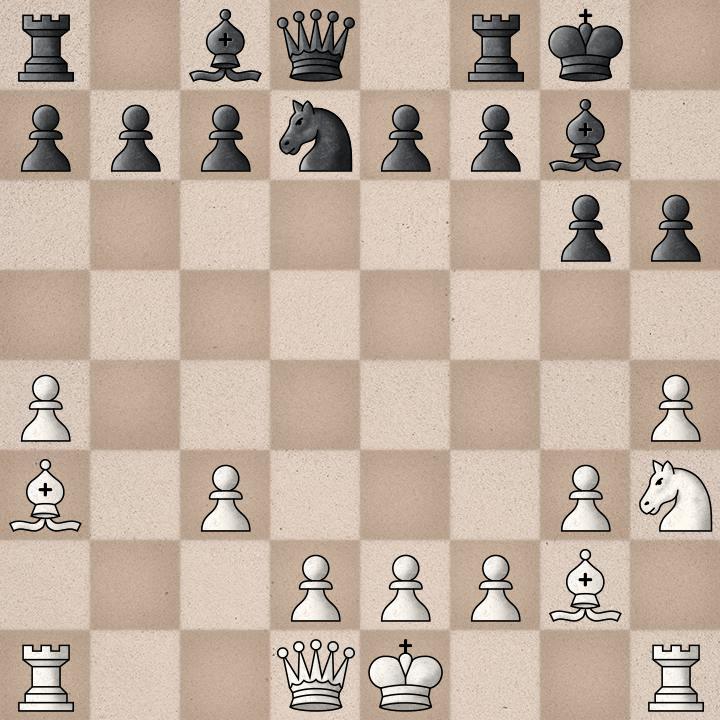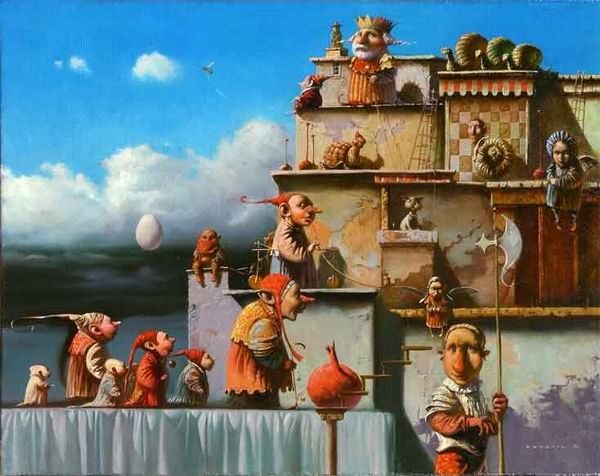
How Opening "Experts" are Ruining Growth of Developing Players
There’s a massive, uncontrolled and unhealthy proliferation of chess opening experts of all kind and provenience. From ELO 1600 all the way up to the super GM circle (where, among others, is sitting a certain famous Twitter celebrity and acclaimed Najdorf expert).
The mushrooming of experts into all sorts of domains like, "visa consultants," "immigration experts," or "life coaches" sees their bold advertising services, making false promises and charging exorbitant amounts. And all of that to provide just a very basic service.
In chess, this corrupt practice has been established around openings. It creates a grave disservice and has direct consequences for the average player in that it is slowing down/stopping them altogether along the growth path. Amateur players have thus become prisoners of the opening theory and their own conditioning that has been put on them and used by opening "experts."
We beg students who are addicted to opening manuals to remember that most players who spend their time studying theory never reach A-level. –FM Pelts and GM Lev Alburt, Comprehensive Chess Course (Vol II)
Instead, developing players should primarily be concerned about how to improve their understanding of chess and how to Think Better. Why spending your time on some lines that you might face on the board once in 300 games, or maybe never? Why not working on upgrading your thought process, something you use at each and every move?
.
ART OF DECEPTION
To see how bad things are in the openings dept and what kind of hollow promises the experts are bombarding you with, read the following SHOCK AND AWE WHITE IN ANY VARIATION advertisement for the Sicilian Scheveningen, where a GM and renowned opening expert shows you how to,
"SUBDUE any (sic) attack White throws at you,
"BEAT White to the punch with an attack of your own,
"LAUNCH some Tal-like (sic) attacks of your own on the queenside with pawn storms and exchange sacrifices,
"START GETTING winning results in your own games straight away.
"Even if you’ve never played the Sicilian, you’ll quickly be able to learn all its dynamic beauty with the Scheveningen.
"Forget the complexities of the Najdorf and sharp complications of the Sveshnikov - go straight to success (sic) with the Scheveningen."
What's the best is "you’ll get all the benefits of the Scheveningen with none of the pain points." (sic) <end of advertisement>
Holy cow!
To all this the famous aforementioned opening guru tweeted, "Honestly, compared to Najdorf, all openings against 1.e4 are sh*t. Get my course, it's on discount now." (well, on discount the original $250 value is now mere $150; if this is not a robbery then what is it? you can get ten classics chess books, say selected games of Alekhine, Bronstein, Keres, Fischer... to learn something about chess ideas and concepts).

.
In reality, the opening contributes little to success in chess. Like in the theater, it just represents rising action, Act 1 of play, where you activate your men to set up the environment for a climax occurring in the middlegame. (It is there you are supposed to show your creativity and understanding of chess). With the play resolution coming either in midgame itself, or in Act 3, what we call endgame.
Yet, the hordes of opening experts are trying hard to make you think the best way of how to win in chess, quick and easy, is to play for opening tricks and traps! To make up for lack of understanding of the game, try to crush the opponent in ten moves or so. Here are just some of funny and absurd claims from book titles and blog headlines opening experts are making. These claims symbolize the deceptive potential of the wrong path.

Play 1.b3 better than Nakamura (sic!) with These Opening Traps (1.b3 new tricks)
Opening tricks to WIN FAST
Opening TRICK to fool your opponent
Sneaky Opening variation you must learn
5 Opening Traps and Tricks every beginner must know
10 Most Deadly Chess Opening Traps You Must Know
Winning chess the EASY WAY
Savage (Devastating, Dirty, Sneaky, Tricky, Crushing, etc.) chess opening traps
1.d4 Players HATE This! | Dangerous Winning Ideas
Trap heaven-Opening traps
Traps, traps and more traps
Amazing trap for beginners
You Won't Believe This Simple Trap Even GMs Miss, etc., etc.
Simply astonishing, isn't it?
 .
.
Chess books publishing and chess portals are following suit. They are tirelessly producing tons of copies of invaluable content on openings. On all channels, openings count for more than HALF of all chess material delivered to you. Here's some facts and the number of books/courses/videos as of early August.
Chessable ("No.1 site for chess improvement and science-based learning backed by the World chess champion Magnus Carlsen..")
Openings 341
Endgames 38
Strategy 92
Tactics 227
New In Chess
Openings 412
Middlegame 68
Strategy 86
Tactics 68
Improvement 84
Attack and Defense 33
Endgames 50
Everyman Chess
Openings 277
Games Collections 69
Training books 135
Improvers 32 (5 on ops)
Quality Chess
Openings 93
Improvement 83
Gambit Publications
Openings 59
Endings 14
Puzzles and Studies 14
Training, Strategy and Improvement 37
Beginners and Intermediate 19
Tactics 19
Games Collections and General 9
.
Another example of the sad state of affairs concerning openings, a picture from a Youtube video keeps coming to mind. GM AV is making Black's moves from a QG line before a group of students, then checking their rot memorization of the "right" move for White in a parrot fashion which they perform in unison (also science-backed I guess).
The situation isn't much better in blogging, either. The blogging space is, sadly, also overcrowded with opening enlightenments.

So it seems that, in the Brave New World of Chess, average players have basically been brainwashed into being one-dimensional consumerists of openings with no regard or interest in seeing chess for themselves. Or in thinking for themselves.
The chess world is filled with endless (mostly opening) distractions that keep us perpetually numb to the world of ideas.
"Opening theory tends to play a disproportionately large role in the life of the average chess player. Most players spend the great majority of their chess study time on openings, yet still believe that this stage is their Achilles Heel and that they would be much stronger ‘if only I knew my openings properly’. In reality, however, this is simply not the case. Except at the world championship or very top GM level, the openings are really not that huge a factor in success. The vast majority of games are decided by mistakes, usually tactical, in the middlegame or endgame, and for the typical amateur player, these mistakes are themselves often the result of spending so much time studying openings, at the expense of other aspects of the game. In his famous formulation of how many hours a player should need to advance from beginner to master, Emanuel Lasker argued that openings study should occupy just 10 of the 200 hours he thought necessary – a mere 5%! By contrast, most club and congress players nowadays probably spend 80% or more of their chess study time on openings." –Gerard Welling & Steve Giddins, Side-Stepping Mainline Theory Cut Down on Chess Opening Study and Get a Middlegame You are Familiar With
.
OPENING THEORY MYTH
Opening "theory" is nothing more than moves from master practice. There is nothing scientific about it. That is why the word "theory" is misleading as it, by definition, presupposes a "plausible or scientifically acceptable general body of principles offered to explain phenomena." And yet, what we are seeing is how some main lines go to the grave of openings history while new lines are becoming popular. Specific moves of an opening can't therefore be called a theory.
This is position from Petrosian - Ilivitsky, 21ch, Kiev 1954 (after White's move 5)

.
They teach us early in our chess education there are some opening principles we need to stick to. Like quick activation of pieces and building the strong pawn center. Can the above position with NO developed piece and NO pawn in the center serve as an illustration of these opening principles? Nevertheless, this kind of opening treatment is quite possible. The "safe zone" in the opening is very large and tolerates eccentricities of this kind quite liberally.
If the above handling of opening was possible in the main USSR chess event, what many considered an unofficial World championship back then, why not in your own amateur games where you can play positions to your own liking and style? Why to play boring London and Berlin, some complex and knotty lines the intricacies of which are beyond understanding of average player? Be yourself, stop living chess with a stranger's mind.
The Father of the Russian chess school, Mikhail Chigorin was of the view that you can avoid the book moves, while achieving a solid, no-worse position (if not seeing winning Tal-like attacks crushing your opponent as the Scheveningen opening expert is claiming above). Actually, many main op lines have been originally invented by amateur players and introduced into the Master play later on.
The game continues, 5...g6 6,Bg2 Bg7 7.h4 h6 8.a4 O-O 9.Ba3 Nd7 10.Nh3 etc.

"The essence of chess doesn't, of course, lie in openings," Mikhail Botvinnik. "True understanding is shown in complex and original positions with no help from anywhere, when you have to find a solution for yourself. He who knows how to do it will feel confident at the chess table."
"The study of textbooks only makes sense if it is paving the way of learning how to think on your own," Dr Max Euwe.
So folks, don't waste too much time on openings. Learn how to think better
.
ART OF FLIMFLAM. CONTINUED
An artificially created market that demands openings as a "quick and easy" fix has a devastating effect on the developing player's road to growth, that's for sure. The primary victim is the player's staying-underdeveloped, never-improving thought process.
But what all of this is telling us about its creators, opening "experts" themselves?
Do they really think they are helping us with their trifle manuals? (Do you?)
Are they doing all this to show their creativity and chess understanding, or maybe for a quick and easy profit instead?
Or perhaps the opening experts simply have nothing better to offer us? They may not be capable, without their trustworthy engines, to write about any subtler chess topics at all?
Writing about openings is comparatively easy, because you are setting out specific lines you check with an engine. Writing about middlegames and endings is hard, because you have to communicate concepts. –Cuddles T
.
.

